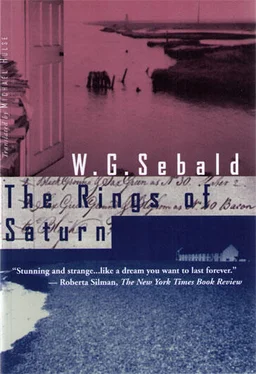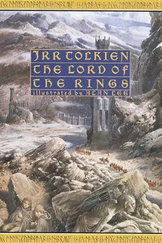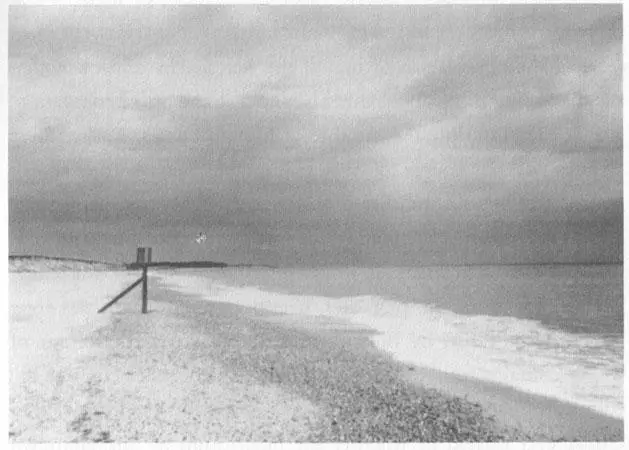
Recalling the uncertainty I then felt brings me back to the Argentinian tale I have referred to before, a tale which deals with our attempts to invet secondary or tertiary worlds. The narrator describes dining with Adolfo Bioy Casares in a house in Calle Gaona in Ramos Mejìa one evening in 1935. He relates that after dinner they had a long and rambling talk about the writing of a novel that would fly in the face of palpable facts and become entangled in contradictions in such a way that few readers — very few readers — would be able to grasp the hidden, horrific, yet at the same time quite meaningless point of the narrative. At the end of the passage that led to the room where we were sitting, the author continues, hung an oval, half-fogged mirror that had a somewhat disquieting effect. We felt that this dumb witness was keeping a watch on us, and thus we discovered — discoveries of this kind are almost always made in the dead of night — that there is something sinister about mirrors. Bioy Casares then recalled the observation of one of the heresiarchs of Uqbar, that the disturbing thing about mirrors, and also the act of copulation, is that they multiply the number of human beings. I asked Bioy Casares for the source of this memorable remark, the author writes, and he told me that it was in the entry on Uqbar in the Anglo-American Cyclopaedia . As the story goes on, however, it is revealed that this entry is nowhere to be found in the encyclopaedia in question, or rather, it appears uniquely in the copy bought years earlier by Bioy Casares, the twenty-sixth volume of which contains four pages that are not in any other copy of the edition in question, that of 1917. It thus remains unclear whether Uqbar ever existed or whether the description of this unknown country might not be a case similar to that of Tlön, the encylopaedists' project to which the main portion of the narrative in question is devoted and which aimed at creating a new reality, in the course of time, by way of the unreal. The labyrinthine construction of Tlön, reads a note added to the text in 1947, is on the point of blotting out the known world. The language of Tlön, which hitherto no one had mastered, has now invaded the academies; already the history of Tlön has superseded all that we formerly knew or thought we knew; in historiography, the indisputable advantages of a fictitious past have become apparent. Almost every branch of learning has been reformed. A ramified dynasty of hermits, the dynasty of the Tlön inventors, encyclopaedists and lexicographers, has changed the face of the earth. Every language, even Spanish, French and English, will disappear from the planet. The world will be Tlön. But, the narrator concludes, what is that to me? In that peace and quiet of my country villa I continue to hone my tentative translation, schooled on Quevedo, of Thomas Browne's Urn Burial (which I do not mean to publish).
4. The Battle of Sole Bay — Nightfall — Station Road in The Hague — Mauritshuis — Scheveningen — The tomb of St Sebolt — Schiphol airport — The invisibility of man — The Sailors' Reading Room — Pictures from the Great War — The concentration camp at Jasenovac on the Sava
The rain clouds had dispersed when, after dinner, I took my first walk around the streets and lanes of the town. Darkness was falling, and only the lighthouse with its shining glass cabin still caught the last luminous rays that came in from the western horizon.
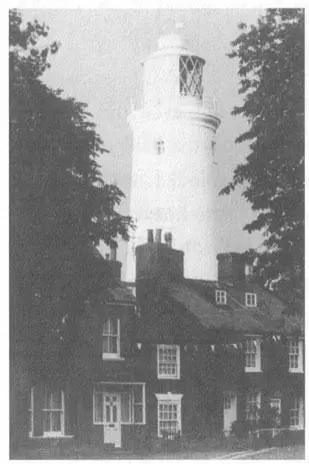
Footsore and weary as I was after my long walk from Lowestoft, I saw down on a beach on the green called Gunhill and looked out on the tranquil sea, from the depths of which the shadows were now rising. Everyone who had been out for an evening stroll was gone. I felt as if I were in a deserted theatre, and I should not have been surprised if a curtain had suddenly risen before me and on the proscenium I had beheld, say, the 28th of May 1672— that memorable day when the Dutch fleet appeared offshore from out of the drifting mists, with the bright morning light behind it, and opened fire on the English ships in Sole Bay. In all likelihood the people of Southwold hurried out of the town as soon as the first cannonades were fired to watch the rare spectacle from the beach. Shading their eyes with their hands against the dazzling sun, they would have watched the ships moving hither and thither, apparently at random, their sails billowing in a light northeast wind and then, as they manoeuvred ponderously, flapping once again. They would not have been able to make out human figures at that distance, not even the gentlemen of the Dutch and English admiralties on the bridges. As the battle continued, the powder magazines exploded, and some of the tarred hulls burned down to the waterline; the scene would have been shrouded in an acrid, yellowish-black smoke creeping across the entire bay and masking the combat from view. While most of the accounts of the battles fought on the so-called fields of honour have from time immemorial been unreliable, the pictorial representations of great naval engagements are without exception figments of the imagination. Even celebrated painters such as Storck, van der Velde or de Loutherbourg, some of whose versions of the Battle of Sole Bay I studied closely in the Maritime Museum in Greenwich, fail to convey any true impression of how it must have been to be on board one of these ships, already overloaded with equipment and men, when burning masts and sails began to fall or cannonballs smashed into the appallingly overcrowded decks.
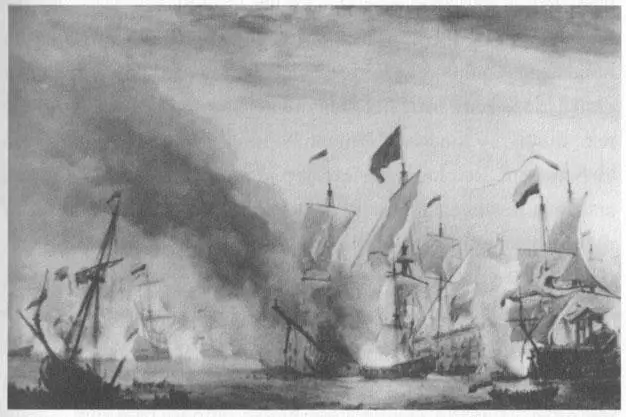
On the Royal James alone, which was set aflame by a fireship, nearly half the thousand-strong crew perished. No details of the end of the three-master have come down to us. There were eye-witnesses who claimed to have seen the commander of the English fleet, the Earl of Sandwich, who weighed almost twenty-four stone, gesticulating on the afterdeck as the flames encircled him. All we know for certain is that his bloated body was washed up on the beach near Harwich a few weeks later. The seams of his uniform had burst asunder, the buttonholes were torn open, yet the Order of the Garter still gleamed in undiminished splendour. At that date there can have only been a few cities on earth that numbered as many souls as were annihilated in sea-battles of this kind. The agony that was endured and the enormity of the havoc wrought defeat our powers of comprehension, just as we cannot conceive the vastness of the effort that must have been required — from felling and preparing the timber, mining and smelting the ore, and forging the iron, to weaving and sewing the sailcloth — to build and equip vessels that were almost all predestined for destruction. For a brief time only these curious creatures sailed the seas, moved by the winds that circle the earth, bearing names such as Stavoren, Resolution, Victory, Groot Hollandia and Olyfan, and then they were gone. It has never been determined, which of the two parties in the naval battle fought off Southwold to extort trading advantages emerged victorious. It is certain, however, that the decline of the Netherlands began here, with a shift in the balance of power so small that it was out of proportion to the human and material resources expended in the battle; while on the other hand the English government, almost bankrupt, diplomatically isolated, and humiliated by the Dutch raid on Chatham, was now able, despite a complete absence of strategic thinking and a naval administration on the verge of disintegration, and thanks only to the vagaries of the wind and the waves that day, to commence the sovereignty at sea that was to be unbroken for so long. — As I sat there that evening in Southwold overlooking the German Ocean, I sensed quite clearly the earth's slow turning into the dark. The huntsmen are up in America, writes Thomas Browne in The Garden of Cyrus , and they are already past their first sleep in Persia. The shadow of night is drawn like a black veil across the earth, and since almost all creatures, from one meridian to the next, lie down after the sun has set, so, he continues, one might, in following the setting sun, see on our globe nothing but prone bodies, row upon row, as if levelled by the scythe of Saturn — an endless graveyard for a humanity struck by falling sickness. I gazed farther and farther out to sea, to where the darkness was thickest and where there extended a cloudbank of the most curious shape, which I could barely make out any longer, the rearward view, I presume, of the storm that had broken over Southwold in the late afternoon. For a while, the topmost summit regions of this massif, dark as ink, glistened like the icefields of the Caucasus, and as I watched the glare fade I remembered that years before, in a dream, I had once walked the entire length of a mountain range just as remote and just as unfamiliar. It must have been a distance of a thousand miles or more, through ravines, gorges and valleys, across ridges, slopes and drifts, along the edges of great forests, over wastes of rock, shale and snow. And I recalled that in my dream, once I had reached the end of my journey, I looked back, and that it was six o'clock in the evening. The jagged peaks of the mountains I had left behind rose in almost fearful silhouette against a turquoise sky in which two or three pink clouds drifted. It was a scene that felt familiar in an inexplicable way, and for weeks it was on my mind until at length I realized that, down to the last detail, it matched the Vallüla massif, which I had seen from the bus, through eyes drooping with tiredness, a day or so before I started school, as we returned home from an outing to the Montafon. I suppose it is submerged memories that give to dreams their curious air of hyper-reality. But perhaps there is something else as well, something nebulous, gauze-like, through which everything one sees in a dream seems, paradoxically, much clearer. A pond becomes a lake, a breeze becomes a storm, a handful of dust is a desert, a grain of sulphur in the blood is a volcanic inferno. What manner of theatre is it, in which we are at once playwright, actor, stage manager, scene painter and audience?
Читать дальше
